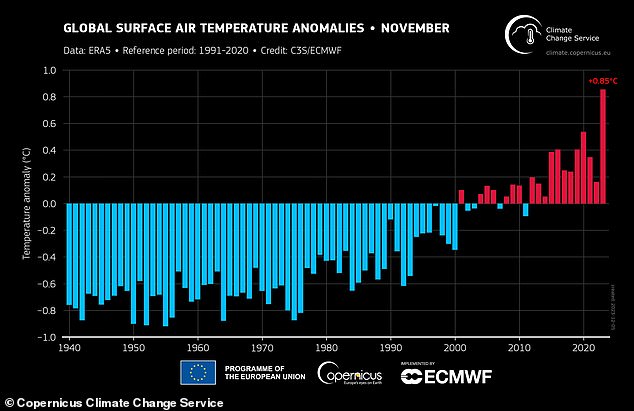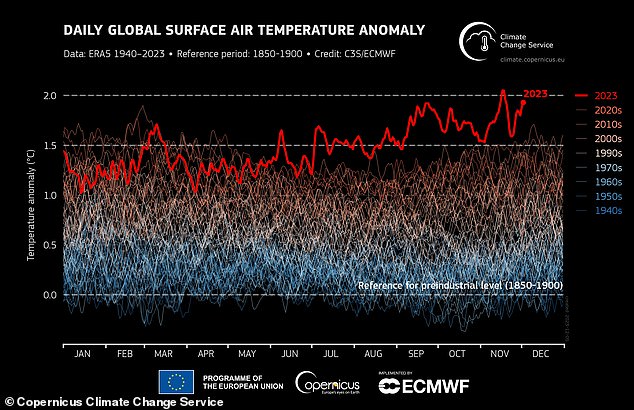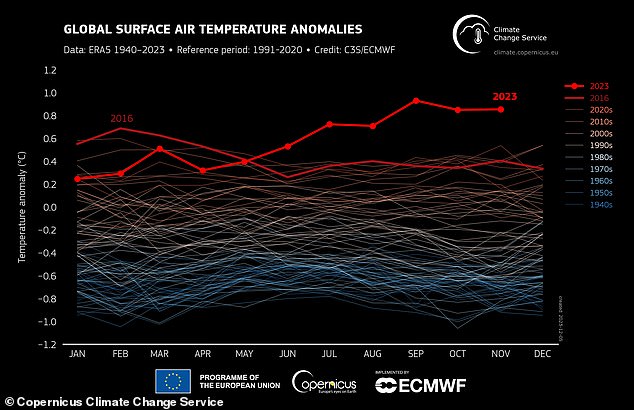November was officially the hottest on RECORD – cementing 2023 as the warmest in history, report reveals
- The average temperature in November was 57.6°F, which is 1.5°F above average
- This also marks the hottest fall on record and the hottest in history
Last month broke previous temperature records to become the hottest November on record.
This marks the fifth consecutive month of record temperatures, with every month since June having been the hottest month on record.
Data from the Copernicus Climate Change Service (C3S) found that the average global temperature in November was 57.6 degrees Fahrenheit (14.22 degrees Celsius).
This is 1.53°F (0.85°C) higher than the average for the past 30 years.
Exceptionally warm November temperatures make this the hottest fall since records began.
November was the fifth consecutive month of record-breaking temperatures, with the Copernicus Climate Change Service recording the hottest autumn on record. Pictured: A beach in Corsica on November 20
The results are based on computer analyzes of the ERA5 dataset, a collection containing billions of hourly meteorological recordings from satellites, ships and weather stations.
The analysis found that November's temperature anomaly – the difference between recorded temperatures and the average between 1991 and 2020 – was one of the largest ever recorded.
This year's northern autumn – the period between September and November – was also the hottest on record by a wide margin, with the average temperature reaching 59.54°F (15.3°C) – 1.58°F (0.88°C) above average.
In addition, Europe experienced its second warmest autumn with average temperatures 2.57°F (1.43°C) above the baseline average.

This year was the hottest November on record, with air temperatures averaging 1.53°F (0.85°C) above the average from 1991 to 2020.
Samantha Burgess, Deputy Director of C3S, said: “2023 has now seen a record six months and two record-breaking seasons.
“Extraordinary global November temperatures, including more than 2°C two days above pre-industrial levels, mean 2023 is the warmest year in recorded history.”
Average global temperatures from January to November rose slightly above the 11-month average of 2016, the previous hottest year.
Throughout the year, the average temperature was 2.63 °F (1.46 °C) above the pre-industrial average for the period between 1850 and 1900.
This is only a few degrees away from the symbolic 1.5°C temperature rise that countries pledged to avoid as part of the Paris climate agreement.

Data shows global temperatures are steadily rising, making November the hottest fall and year on record.
These findings come as world leaders meet at the United Nations Climate Change Conference (COP28) to discuss international policy on climate change.
There, the countries are expected to agree on proposals to reduce the impact of methane emissions and set a path to reduce the use of fossil fuels.
However, data from the Global Carbon Budget reveals that CO2 emissions rose to their highest levels on record in 2023.
“As long as greenhouse gas concentrations continue to rise, we cannot expect results different from those we saw this year,” said Carlo Bontempo, global director of C3S.
He added: “Temperatures will continue to rise, as will the effects of heat waves and drought.
“Getting to net zero as soon as possible is an effective way to manage our climate risks.”

Average global temperatures for 2023 were just under 1.5 degrees Celsius above pre-industrial levels that countries pledged to avoid as part of the Paris climate agreement.
The data also reveals that the ten years between 2010 and 2020 were the hottest decade in human history across land and sea.
Worryingly, this is also causing sea temperatures to rise and ice sheets to thin.
Antarctic sea ice was at its second lowest level on record in November, nine percent below average.
This comes after ice thickness recorded record low levels for this time of year by a large margin for six consecutive months.
Arctic sea ice was less affected at the ninth lowest level on record, but still four percent below average in November.
This is likely related to sea temperatures, which were the highest on record for November.
(tags for translation)dailymail
